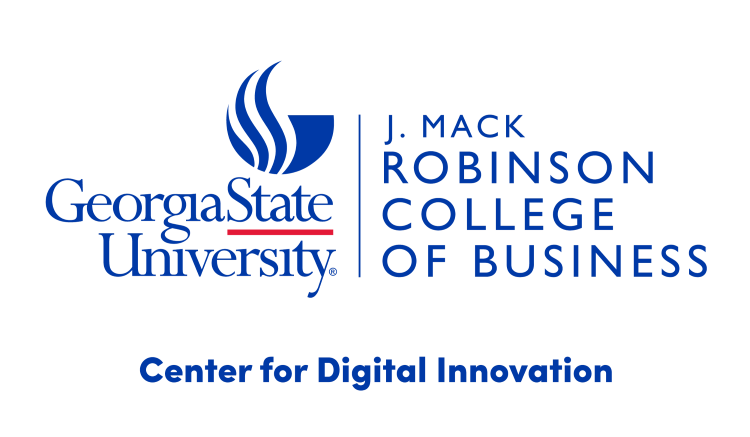Realizing the value creation potential of digital technologies involves understanding how they can empower individuals, how organizations can deploy digital assets, architect platforms and orchestrate ecosystems, and how smart collectives can be organized and governed.
We do not limit our focus to one technology or problem domain. Rather, we are investigating on how advances in digital technologies, in combination with other resources, are fueling the digital revolution that is transforming business and society.
We are conducting these investigations in partnership with companies across industries (e.g., Apollo Hospitals Group, China Mobile, Deutsche Bank, Emory Healthcare, Grady Hospitals, Daimler-Chrysler, Georgia-Pacific, Hewlett-Packard, Medical College of Georgia, IBM, SAP, UPS, SunTrust, etc.) and with researchers at leading universities across the world.
We are working to understand how digital innovations can create new possibilities in a variety of industries ranging from IT services and software, logistics and supply chains, to healthcare. We are also looking at how digital innovations can empower socio-economically disadvantaged people to live fulfilling and healthy lives.
Digital innovations can provide individuals with access to knowledge, advice and support from social networks, and other resources. They also introduce a range of new considerations related to privacy and security. Our research has been looking at how digital innovations can empower individuals in different contexts including rural entrepreneurship, healthcare, and innovation teams.
Advances in automated learning and new modes of digital collaboration are challenging traditional assumptions of how collectives are organized and governed, the value that they create, and the risks to their sustainability. Our studies have examined how collectives can be organized and governed to co-create value in settings from open source development to supply chains to the Wikipedia community to online patient communities.
Achieving the successful implementation and effective use of IT solutions is in the critical pathway for organizations to creating value from digital innovations. Our studies have generated theoretical understanding and managerial insights on how to: effectively direct IT investments and measure the returns from these investments, develop IT-enabled capabilities for innovation and operations, manage complex development projects, drive the effective utilization of digital resources ranging from enterprise systems to social media to business intelligence to mobile services, and digitize products and services and integrate/reconfigure resources with agility.
Platform business models are a radical departure from traditional business models anchored in managing the lifecycles of product and services. Our studies have generated theoretical understanding and practical insights on how firms can design technological platforms to transform traditional operations into novel business models, how governance choices of the platform can augment virtuous ecosystems, and how platform architecture and policies can redefine innovation processes.
We are working to understand how digital innovations can create new possibilities in a variety of industries ranging from IT services and software, logistics and supply chains, to healthcare. We are also looking at how digital innovations can empower socio-economically disadvantaged people to live fulfilling and healthy lives
A range of IT innovations are disrupting how clinical and administrative processes have been conducted in hospitals, how healthcare services have been provided to consumers, and how individuals monitor and take care of their health. Our studies have generated theoretical understanding and actionable insights on innovating clinical processes and revenue cycle management, engaging patients and coordinating patient transitions, and designing online where physicians can signal trustworthiness and the feedback from patients can be meaningfully synthesized and shared.
Firms are challenged to rethink what customer-facing activities are conducted in different online and offline channels, and how to engage with online marketplaces that captures the spirit of platform business model. Our research in this area has examined how firms can create synergies through the design of effective omnichannel models in contexts ranging from traditional businesses (e.g., retailing, real estate) to hi-tech development.
A range of technological innovations is redefining how IT solutions are developed and provided. Our work in this area has generated theoretical understanding and actionable insights on the design of development methods and the management of development teams, and platform models to redefine how innovative solutions are conceived, developed and deployed to the market.
Digital innovations can empower individuals to improve their lives and livelihoods, but in the pathway to realize this potential are thorny issues related to resource inequities, social structures, attitudes and behaviours. Our large-scale field studies in collaboration with government agencies and industry have contributed to our understanding in areas such as: how digital inequalities can be addressed through government policies, how infant mortality can be addressed through frugal digital innovations targeted at mothers while overcoming hindrance from their social networks, and how frugal digital innovations can broaden access to quality healthcare in rural parts of developing countries.
A range of innovations ranging from process technologies to autonomous vehicles is redefining the agility and responsiveness of supply chains. Our research has generated theoretical understanding and actionable insights on how supply chains can be redesigned, how partners can collaborate and coordinate their innovation and operational activities, and how supply chain relationships can be effectively governed through service-level agreements, other contractual provisions, and relational practices.
We are collaborating with MIT and Quinsigamond Community College to explore the potential of GenAI tutors in providing equitable, scalable, and accessible personal student support, particularly for minority-serving institutions. We aim to develop, implement, and evaluate an AI-based personal tutor that can cater to the diverse learning needs of students across various course formats, promoting inclusive learning outcomes and sharing insights for broader application development.











